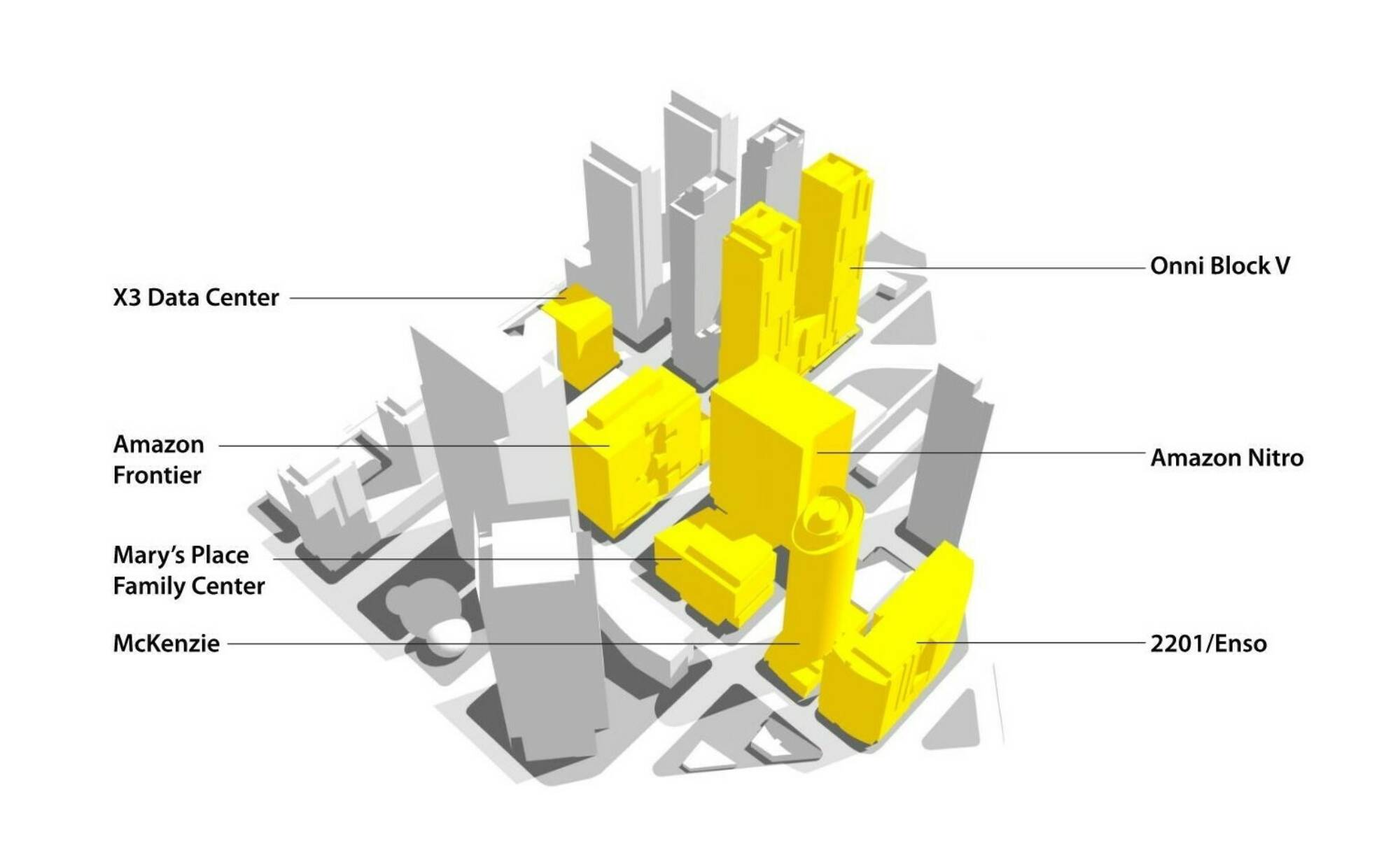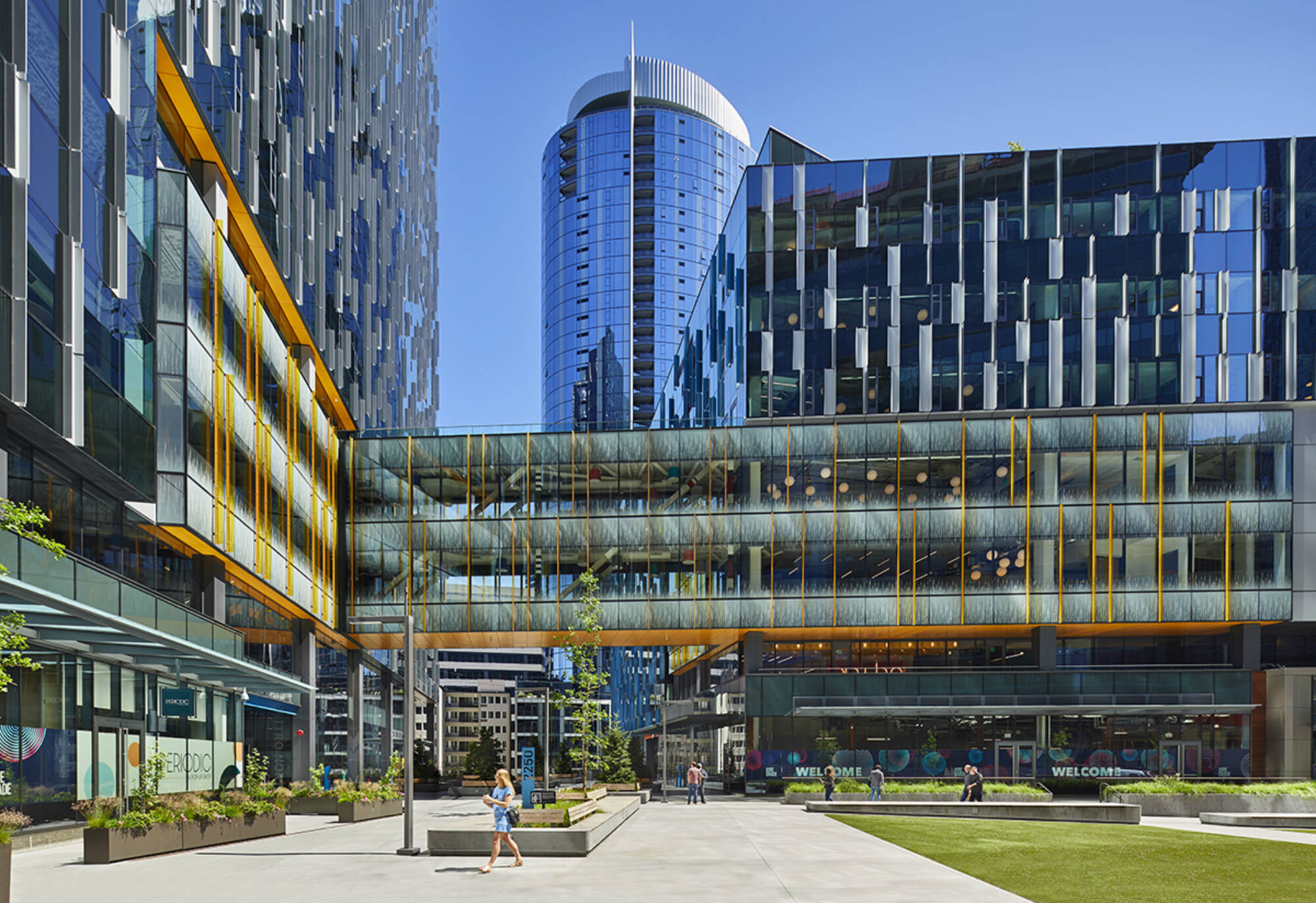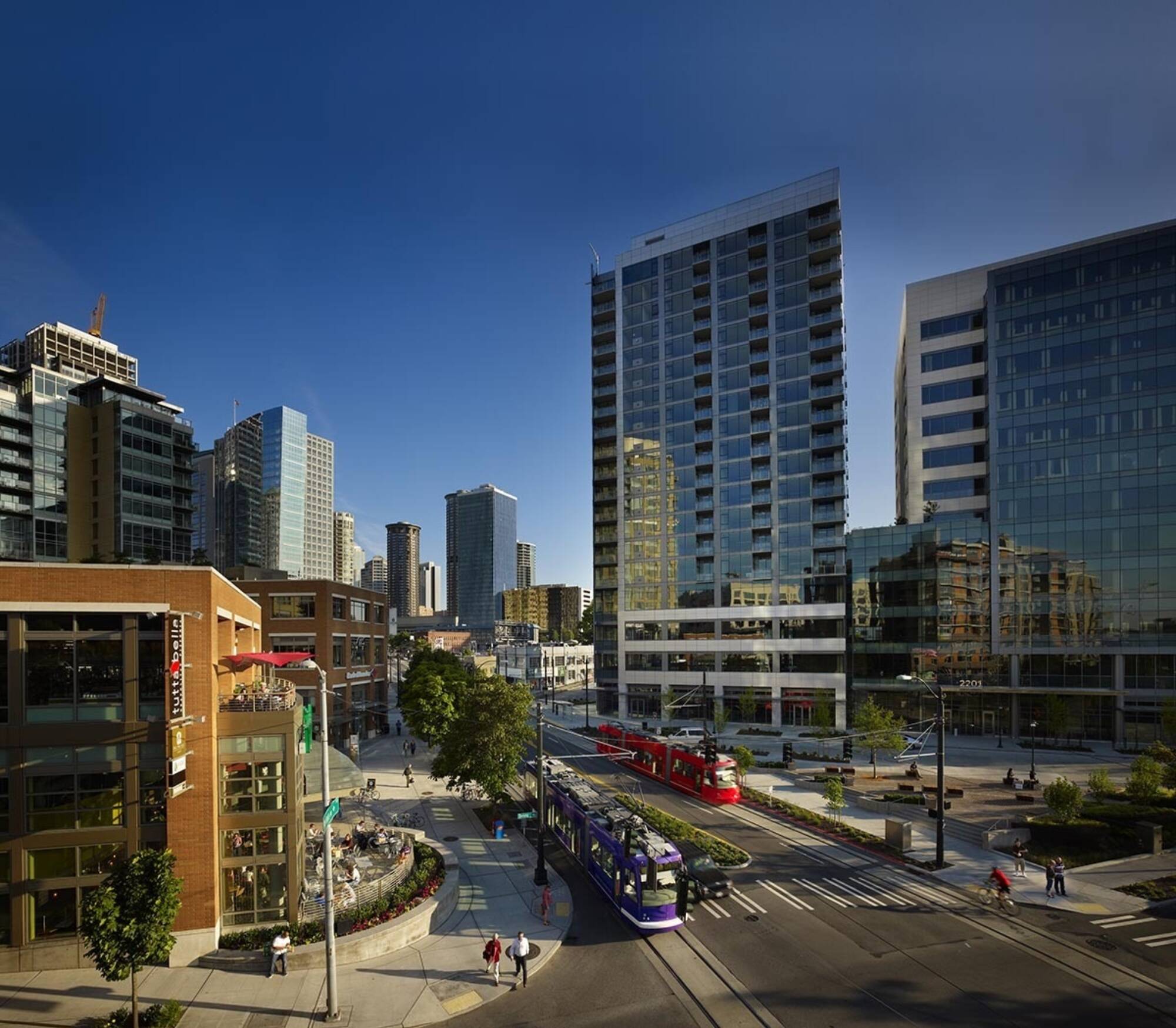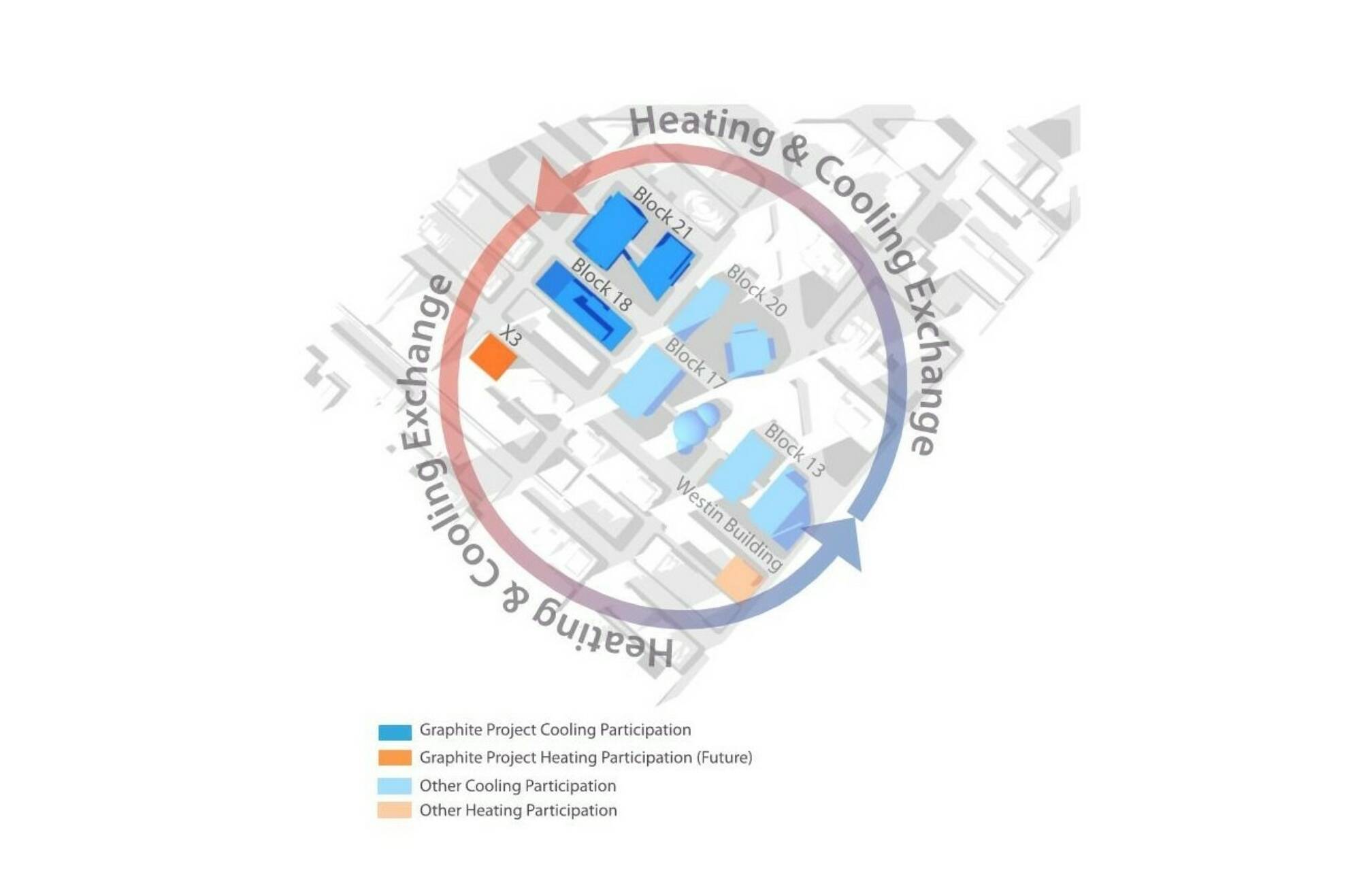Mixed-Use Districts
03/13/24

Sustainable Communities Case Study: The Denny Regrade
Introduction
As an integral part of the revitalization of Seattle’s Denny regrade neighborhood, Graphite projects combine to provide a model of a sustainable urban community that exemplifies principles of resource conversation, transportation synergies, lifestyle benefits and long-term flexibility. Graphite has played a pivotal role in developing 6 buildings within a 4-block area that serve the neighborhood with a robust offering of residential, commercial office, retail, and public amenities. Combined, the projects offer an impressive array of program elements:

Properties: 2201/Enso, McKenzie, Amazon Nitro, Amazon Frontier, Mary’s Place Family Center, Onni Block V, X3 Data Center
Residential: 1,100 Apartments, 135 condominiums, 200+ shelter beds, 85,000 SF Retail, 2 million SF Office
Open Space: 50,000 SF public open space, including over 650 Lineal Feet of frontage on Bell Street Park
Amenities: Child Care, Public Art (“Stumpery” Hillclimb at 8th and Bell, “Murmuration” soffit feature at 8th Avenue, Dog Park at Nitro South Plaza)
Complimentary Uses
By combining uses within each block – and in some cases within one building – the projects of the Denny Regrade employ vertical density to increase overall site utilization and reduce the amount of area required to house these functions as compared to horizontal, single-use models where each program element may be in an individual building. Construction and operational efficiencies follow, as site disturbance is minimized, structural components perform dual duty, and egress, mechanical and vertical transportation elements are optimized to serve the various uses contained within the vertical stack of each structure. Building mechanical elements are consolidated within the subterranean garages and rooftops, freeing up the ground plane for open space, circulation, and active uses, while the towers above maintain high efficiency and program flexibility. The net result is the ability to fit more value within a smaller container, doing more with less.
There are likewise experiential and lifestyle benefits that accompany this community-driven sustainable approach. Buildings contain uses that activate the neighborhood throughout the day. While traditional single-use properties typically see peak intensity that cycles with their use – office during business hours, retail and residential in evenings and weekends, open space activity that varies with weather and season – the mixed-use Denny Triangle neighborhood blends these uses to provide engagement and activation on complimentary cycles. The same workers who occupy offices during the day may also live in one of the on-site residences and take advantage of the diverse retail and service offerings, resulting in 24/7/365 activity. By offering this diversity on site and convenient connections to adjacent uses, transportation demands are also reduced as there is less need to travel to attend to the needs of daily life.

Connectivity
As it is located in downtown Seattle, the Denny Regrade neighborhood is inherently well-served by close proximity to regional transit networks, including protected bike lanes, RapidRide bus system, the streetcar, and future light rail expansion projects. This gives those who choose to live and work on site the opportunity to stay connected without the need for a car, reducing single-driver trips and their related emissions, as well as lessening demands on road infrastructure.
Additionally, numerous site-specific community transportation solutions have been integrated into the design of the properties themselves, helping address the critical “last mile” connection between broader networks and the places people live & work. These include: South Lake Union Streetcar line with stop at 2201 Westlake, King Country Metro stop on 7th Avenue, Protected Bike Lane on 7th Avenue and Bell Streets, Expansive Cycling facilities on site, with prominent entries designed to welcome bike commuters.
These transportation solutions are not merely a convenience to residents; they provide critical connectivity to schools, hospitals, grocery stores, parks, and other regional destinations that support urban lifestyles for residents who live in the city but choose not to drive every day.

Shared Resources
Functional elements of the buildings in the Denny Triangle have been designed to support density while minimizing resource use.
Mechanical systems in all the buildings employ state-of-the art technology to condition spaces efficiently while providing dedicated fresh air to occupants and operable windows, increasing health and well-being. Where programs are shared within one building, further efficiencies are attained. At 2201 Westlake/Enso, waste heat that is a byproduct from cooling the office space is captured and reused to heat domestic water for the condominium units. Broader neighborhood strategies are also key, as both Amazon Nitro and Frontier have been designed to tap into a hot water loop that circulates and stores excess heat energy from an adjacent high-rise data center to offset on-site heating and conditioning loads.

Parking is another area where sharing between uses allows the neighborhood to do more with less. Located below grade, parking has been designed to flex between office, residential and retail uses as demand fluctuates throughout the day. Spaces occupied by office commuters are available to retail and residential guests on evenings and weekends. This approach offsets the need to construct dedicated parking for each use, reducing the overall size of the garages, and lowering carbon intensity.
As discussed elsewhere, neighborhood and regional amenities are also elements incorporated and shared among the various mix of uses. A glass blowing studio is an engaging art and entertainment venue; a daycare serves both residents on-site and commuters; an on-site bike shop expands mobility options; a corner market and deli offer provisions without the need to a car trip to a large grocer; a dog bakery serves the neighborhoods four-legged residents and guests. All combine to enhance the livability of this sustainable urban community.
Related Insights
Mixed-Use Buildings
03/12/24
Density delivers sustainability. The closer things are, the less energy is used, the more resources are saved, and the fewer emissions it takes to get from one place to another.Mass Timber
03/13/24
Graphite is equipped with knowledge and expertise on Mass Timber construction. We know the variables, the speed of construction, and understand the value in the market of this exciting alternative to steel or concrete construction.Adaptive Re-Use
03/13/24
Mary's Place Family Shelter converted six stories of Class A commercial office into a temporary shelter for hundreds of families in the Denny Regrade neighborhood.